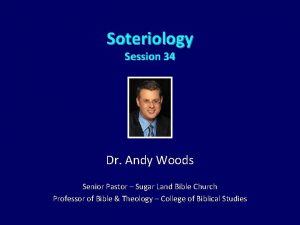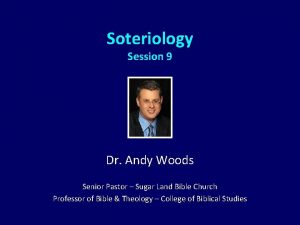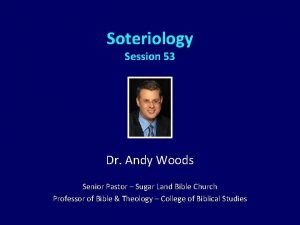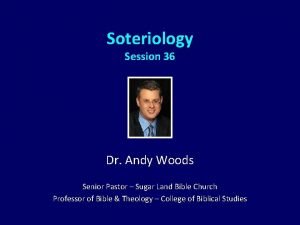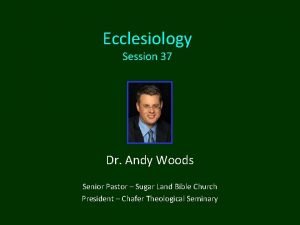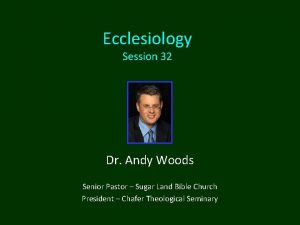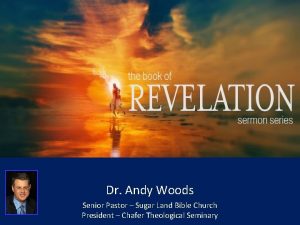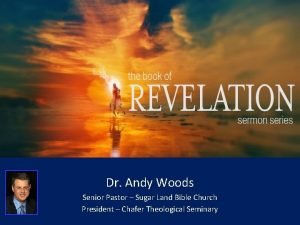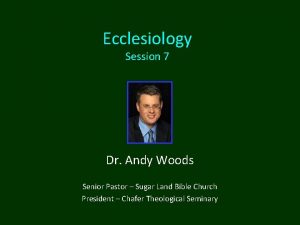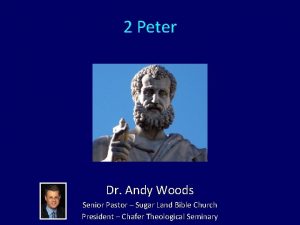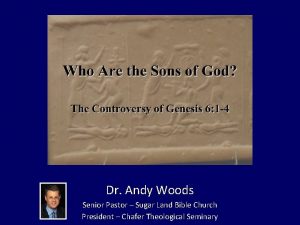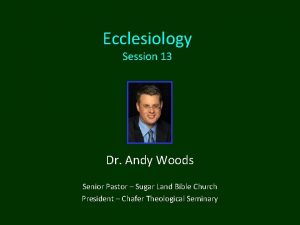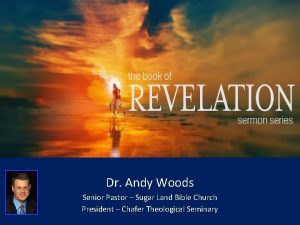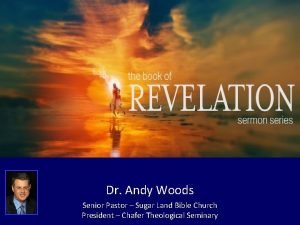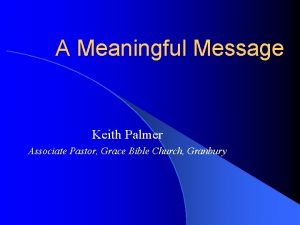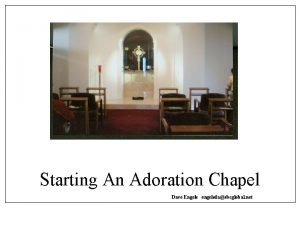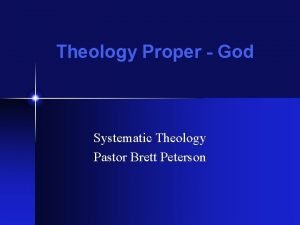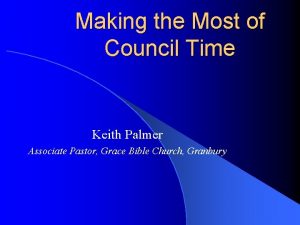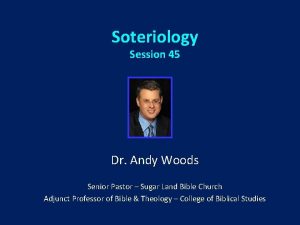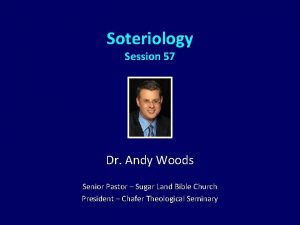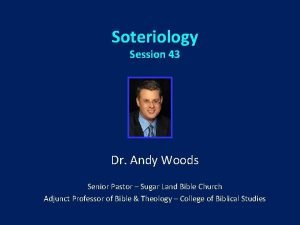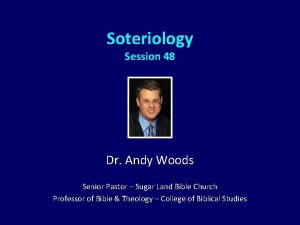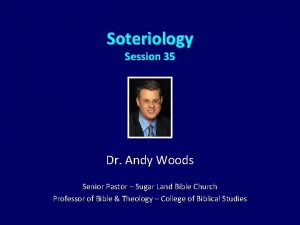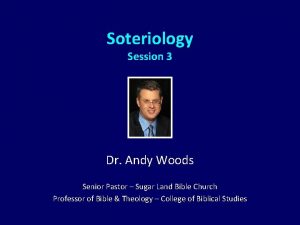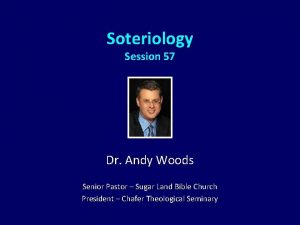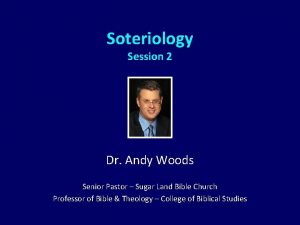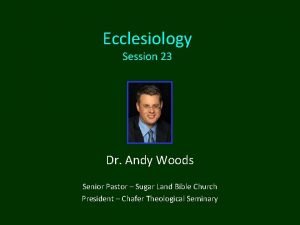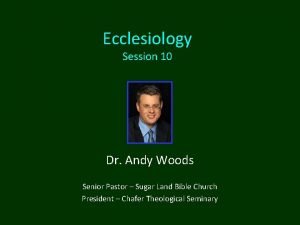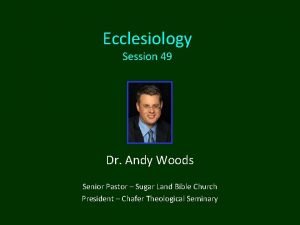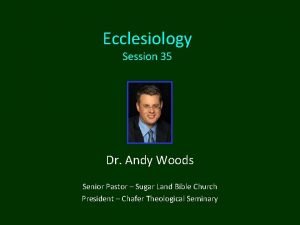Soteriology Session 34 Dr Andy Woods Senior Pastor

















































- Slides: 49

Soteriology Session 34 Dr. Andy Woods Senior Pastor – Sugar Land Bible Church Professor of Bible & Theology – College of Biblical Studies

Soteriology Overview I. III. IV. V. VIII. Definition Election Atonement Salvation words God’s one condition of salvation Results of salvation Eternal security Faulty views of salvation

Soteriology Overview This Session VII. Eternal Security

Definition of Eternal Security “Eternal Security means that those who have been genuinely saved by God’s grace through faith alone in Christ alone shall never be in danger of God’s condemnation or loss of salvation but God’s grace and power keep them forever saved and secure. ” Dennis Rokser, Shall Never Perish Forever, p. 11

Eternal Security Outline 1. Eternal security arguments 2. Response to problem passages

Eternal Security Outline 1. Eternal security arguments 2. Response to problem passages

Eternal Security Outline 1. Eternal security arguments 2. Response to problem passages

Response to Problem Passages 1. OT Passages 2. Passages from Matthew 3. Passages from John 4. Passages from Acts 5. Passages from Paul

Response to Problem Passages 6. Passages from James 7. Passages from Hebrews 8. Passages from 2 Peter 9. Passages from 1 John 10. Passages from Revelation 11. Miscellaneous argument

Response to Problem Passages 1. OT Passages 2. Passages from Matthew 3. Passages from John 4. Passages from Acts 5. Passages from Paul

1. OT Passages a. Adam & Eve (Gen. 1‒ 3) b. Nadab & Abihu (Lev. 10: 1 -2) c. Korah’s rebellion (Num. 16) d. Joshua 24: 20 e. Saul (1 Sam. 16: 14; 28; 1 Chron. 10: 13 -14) f. Solomon (1 Kgs. 11) g. David (Ps. 51: 11) h. Ezekiel 18: 20

Response to Problem Passages 1. OT Passages 2. Passages from Matthew 3. Passages from John 4. Passages from Acts 5. Passages from Paul

2. Passages From Matthew a. Matt. 6: 14 -15 b. Matt. 7: 21 -23 c. Matt. 8: 11 -12; 25: 30 d. Matt. 10: 32 -33 e. Matt. 12: 31 -32 f. Matt. 24: 13 g. Matt. 25: 41

Response to Problem Passages 1. OT Passages 2. Passages from Matthew 3. Passages from John 4. Passages from Acts 5. Passages from Paul

3. Passages From John’s Gospel a. John 6: 66 b. John 15: 6 c. John 20: 30 -31

Response to Problem Passages 1. OT Passages 2. Passages from Matthew 3. Passages from John 4. Passages from Acts 5. Passages from Paul

4. Passages From Acts a. Acts 5: 1 -11 b. Acts 8: 5 -25

4. Passages From Acts a. Acts 5: 1 -11 b. Acts 8: 5 -25

a. Acts 5: 1 -11 1. Ananias and Sapphira were believers a. In church (vs. 11) b. Believers can be influenced by Satan (Matt. 16: 21 -23; Eph. 4: 26 -27; Acts 5: 3) 2. Divine discipline (Heb. 12: 5 -11; Rev. 3: 19) 3. Maximum divine discipline (1 Cor. 11: 30; 1 John 5: 19; Rev. 2: 22 -23) 4. Necessary practical purification of the church in its infant form (vs. 11; Rev. 2: 23)

4. Passages From Acts a. Acts 5: 1 -11 b. Acts 8: 5 -25

b. Acts 8: 5 -25 1. Problem: Simon believed (13) yet he is later described as coveting (18 -19), perishing (20), having no portion (21), heart not right (21), in need of forgiveness (22), bitter (23), in bondage (23) 2. Calvinism – spurious faith? 3. The authenticity of Simon’s conversion a. He believed (13) b. He was baptized (13) c. Parallel with the other Samaritan converts (12) d. His repentant attitude (24)

b. Acts 8: 5 -25 1. Problem: Simon believed (13) yet he is later described as coveting (18 -19), perishing (20), having no portion (21), heart not right (21), in need of forgiveness (22), bitter (23), in bondage (23) 2. Calvinism – spurious faith? 3. The authenticity of Simon’s conversion a. He believed (13) b. He was baptized (13) c. Parallel with the other Samaritan converts (12) d. His repentant attitude (24)

b. Acts 8: 5 -25 1. Problem: Simon believed (13) yet he is later described as coveting (18 -19), perishing (20), having no portion (21), heart not right (21), in need of forgiveness (22), bitter (23), in bondage (23) 2. Calvinism – spurious faith? 3. The authenticity of Simon’s conversion a. He believed (13) b. He was baptized (13) c. Parallel with the other Samaritan converts (12) d. His repentant attitude (24)

Problem Passages in the Gospel of John Part II: Untrustworthy Believers—John 2: 23 -25 William Hendriksen “Many trusted in his name; i. e. , because of the manner in which his power was displayed they accepted him as a great prophet and perhaps even as the Messiah. This, however, is not the same as saying that they surrendered their hearts to him. Not all faith is saving faith. . . ” Vol. 135: Bibliotheca Sacra Volume 135. 1978 (538) (138). Dallas, TX: Dallas Theological

b. Acts 8: 5 -25 1. Problem: Simon believed (13) yet he is later described as coveting (18 -19), perishing (20), having no portion (21), heart not right (21), in need of forgiveness (22), bitter (23), in bondage (23) 2. Calvinism – spurious faith? 3. The authenticity of Simon’s conversion a. He believed (13) b. He was baptized (13) c. Parallel with the other Samaritan converts (12) d. His repentant attitude (24)

Acts 8: 12 -13 (NASB) “But when they believed Philip preaching the good news about the kingdom of God and the name of Jesus Christ, they were being baptized, men and women alike. Even Simon himself believed; and after being baptized, he continued on with Philip, and as he observed signs and great miracles taking place, he was constantly amazed. ”

b. Acts 8: 5 -25 1. Problem: Simon believed (13) yet he is later described as coveting (18 -19), perishing (20), having no portion (21), heart not right (21), in need of forgiveness (22), bitter (23), in bondage (23) 2. Calvinism – spurious faith? 3. The authenticity of Simon’s conversion a. He believed (13) b. He was baptized (13) c. Parallel with the other Samaritan converts (12) d. His repentant attitude (24)

b. Acts 8: 5 -25 4. Arminianism – loss of salvation? 5. Describing a new believer who just came out of the occult (9 -11) with no time for progressive sanctification 6. Answering the negative descriptors a. Coveting (18 -19)? – Simon the first? Philip 1: 14 -17 b. Perishing (20)? 1) John 3: 16 2) Silver perish (20) 3) Temporal: reward, ministry, testimony, discipline (Acts 5: 1 -11), etc…

b. Acts 8: 5 -25 7. Answering the negative descriptors c. No portion (21)? Temporal: reward, ministry, testimony, discipline, etc… d. Heart not right (21)? Ps. 51: 10; 66: 18 e. In need of forgiveness (22)? 1 John 1: 9; 2: 1 f. Bitterness (23)? Eph. 4: 26 -27, 30 -32 g. In bondage (25)? Rom. 6: 16

4. Passages From Acts a. Acts 5: 1 -11 b. Acts 8: 5 -25

Response to Problem Passages 1. OT Passages 2. Passages from Matthew 3. Passages from John 4. Passages from Acts 5. Passages from Paul

5. Passages From Paul a. Gal. 5: 4 h. 2 Cor. 13: 5 b. Gal. 5: 19 -21 i. Gal. 5: 19 -21 c. Rom. 8: 13 j. Philip. 2: 12 d. 1 Cor. 8: 11 k. Col. 1: 23 e. 1 Cor. 9: 24 -27 l. 1 Tim. 5: 15 f. 1 Cor. 11: 28 -30, 32 m. 2 Tim. 2: 12 g. 1 Cor. 15: 2 n. 2 Tim. 4: 10

5. Passages From Paul a. Gal. 5: 4 h. 2 Cor. 13: 5 b. Gal. 5: 19 -21 i. Gal. 5: 19 -21 c. Rom. 8: 13 j. Philip. 2: 12 d. 1 Cor. 8: 11 k. Col. 1: 23 e. 1 Cor. 9: 24 -27 l. 1 Tim. 5: 15 f. 1 Cor. 11: 28 -30, 32 m. 2 Tim. 2: 12 g. 1 Cor. 15: 2 n. 2 Tim. 4: 10

Galatians 5: 4 (NASB) “You have been severed from Christ, you who are seeking to be justified by law; you have fallen from grace. ”

a. Galatians 5: 4 1. The Galatians were believers (4: 6; 5: 16) 2. Three types of Pharisees 3. Galatians is a spiritual life book (3: 3) 4. The Galatians were missing God’s grace in the middle tense of their salvation (not the first tense) 5. Reverting to a performance based relationship in daily living is quite a fall from grace 6. Galatians 5: 4 does not teach a loss of salvation

a. Galatians 5: 4 1. The Galatians were believers (4: 6; 5: 16) 2. Three types of Pharisees 3. Galatians is a spiritual life book (3: 3) 4. The Galatians were missing God’s grace in the middle tense of their salvation (not the first tense) 5. Reverting to a performance based relationship in daily living is quite a fall from grace 6. Galatians 5: 4 does not teach a loss of salvation

Galatians 3: 3 (NASB) “Are you so foolish? Having begun by the Spirit, are you now being perfected by the flesh? ”

Galatians 4: 6 (NASB) “Because you are sons, God has sent forth the Spirit of His Son into our hearts, crying, “Abba! Father!”

Galatians 5: 16 (NASB) “But I say, walk by the Spirit, and you will not carry out the desire of the flesh. ”

a. Galatians 5: 4 1. The Galatians were believers (4: 6; 5: 16) 2. Three types of Pharisees 3. Galatians is a spiritual life book (3: 3) 4. The Galatians were missing God’s grace in the middle tense of their salvation (not the first tense) 5. Reverting to a performance based relationship in daily living is quite a fall from grace 6. Galatians 5: 4 does not teach a loss of salvation


a. Galatians 5: 4 1. The Galatians were believers (4: 6; 5: 16) 2. Three types of Pharisees 3. Galatians is a spiritual life book (3: 3) 4. The Galatians were missing God’s grace in the middle tense of their salvation (not the first tense) 5. Reverting to a performance based relationship in daily living is quite a fall from grace 6. Galatians 5: 4 does not teach a loss of salvation

Galatians 3: 3 (NASB) “Are you so foolish? Having begun by the Spirit, are you now being perfected by the flesh? ”

a. Galatians 5: 4 1. The Galatians were believers (4: 6; 5: 16) 2. Three types of Pharisees 3. Galatians is a spiritual life book (3: 3) 4. The Galatians were missing God’s grace in the middle tense of their salvation (not the first tense) 5. Reverting to a performance based relationship in daily living is quite a fall from grace 6. Galatians 5: 4 does not teach a loss of salvation


a. Galatians 5: 4 1. The Galatians were believers (4: 6; 5: 16) 2. Three types of Pharisees 3. Galatians is a spiritual life book (3: 3) 4. The Galatians were missing God’s grace in the middle tense of their salvation (not the first tense) 5. Reverting to a performance based relationship in daily living is quite a fall from grace 6. Galatians 5: 4 does not teach a loss of salvation

a. Galatians 5: 4 1. The Galatians were believers (4: 6; 5: 16) 2. Three types of Pharisees 3. Galatians is a spiritual life book (3: 3) 4. The Galatians were missing God’s grace in the middle tense of their salvation (not the first tense) 5. Reverting to a performance based relationship in daily living is quite a fall from grace 6. Galatians 5: 4 does not teach a loss of salvation

CONCLUSION

5. Passages From Paul a. Gal. 5: 4 h. 2 Cor. 13: 5 b. Gal. 5: 19 -21 i. Gal. 5: 19 -21 c. Rom. 8: 13 j. Philip. 2: 12 d. 1 Cor. 8: 11 k. Col. 1: 23 e. 1 Cor. 9: 24 -27 l. 1 Tim. 5: 15 f. 1 Cor. 11: 28 -30, 32 m. 2 Tim. 2: 12 g. 1 Cor. 15: 2 n. 2 Tim. 4: 10
 Andy woods pastor wikipedia
Andy woods pastor wikipedia Andy woods soteriology
Andy woods soteriology Andy woods soteriology
Andy woods soteriology Andy woods pastor
Andy woods pastor Andy woods pastor
Andy woods pastor Pastor andy woods sugarland bible church
Pastor andy woods sugarland bible church Pastor andy woods wife
Pastor andy woods wife Pastor andy woods wife
Pastor andy woods wife Sugarland bible church
Sugarland bible church Sugarland bible church
Sugarland bible church 2 timothy 2:15 nasb
2 timothy 2:15 nasb Andy woods pastor age
Andy woods pastor age Andy wood pastor bio
Andy wood pastor bio Andy wood pastor abuse
Andy wood pastor abuse Pastor andy wood
Pastor andy wood Andy woods angelology
Andy woods angelology Andy woods genesis
Andy woods genesis Andy woods the coming kingdom
Andy woods the coming kingdom Major prophets
Major prophets The coming kingdom andy woods
The coming kingdom andy woods Andy woods zechariah
Andy woods zechariah Andy woods daniel
Andy woods daniel Andy woods the coming kingdom
Andy woods the coming kingdom Andy woods ezekiel
Andy woods ezekiel Andy woods daniel
Andy woods daniel Andy woods daniel
Andy woods daniel Sugarland bible church
Sugarland bible church Andy woods sugarland bible church
Andy woods sugarland bible church Andy woods daniel
Andy woods daniel Andy woods angelology
Andy woods angelology Escultura paleocristiano
Escultura paleocristiano Keith palmer pastor
Keith palmer pastor Cuidado com as ovelhas
Cuidado com as ovelhas Oveja sin pastor
Oveja sin pastor Peon de paso
Peon de paso Os pastor
Os pastor Joel rainey pastor
Joel rainey pastor Dave engels
Dave engels Ben pastor la sinagoga degli zingari
Ben pastor la sinagoga degli zingari Lo que sufre la esposa del pastor
Lo que sufre la esposa del pastor Pastor paul kim
Pastor paul kim Steven khoury
Steven khoury Pastor brett peterson
Pastor brett peterson La vida exitosa el pastor
La vida exitosa el pastor El salmo del buen pastor
El salmo del buen pastor Pastor otavio rendeiro filho
Pastor otavio rendeiro filho The pastor and his parishioner summary
The pastor and his parishioner summary Ies julio rey pastor
Ies julio rey pastor Juan 10:1-6
Juan 10:1-6 Council of time m palmer
Council of time m palmer
